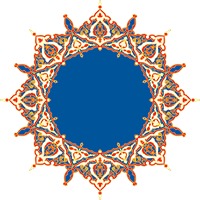Surah al-Duha

- 30پارہ نمبر
- 11آيات
- 1رکوع
- 11ترتيب نزولي
- 93ترتيب تلاوت
- مکیسورہ
In the Name of Allah, the Most Compassionate, the All-Merciful
2. by the night, when it calms and covers (the daylight with its darkness),*
* According to Qatada, Muqatil and Ja‘far al-Sadiq, ‘al-duha’ may also refer to the time when All-Mighty Allah spoke to Musa at Mount Sinai (al-Tur), whereas ‘al-layl’ may refer to the Night of Ascension (al-Mi‘raj) when All-Mighty Allah spoke to Prophet Muhammad (blessings and peace be upon him). See: Tafsir al-Qurtubi, al-Lubab and other authoritative books of tafsir.
والليل إذا سجى
(الضُّحٰی، 93 : 2)
4. Surely, whatever moment (of your Prophetic period) comes after will be far better for you than the former. (Or: The exalted station of the next life will surely be far better for you than the one in this life).
وللآخرة خير لك من الأولى
(الضُّحٰی، 93 : 4)
6. Did He not find you an orphan and sheltered you (with a graceful position)?*
* This verse can also mean: ‘Did He not find you (compassionate) and provide shelter to the orphans (through you)?’ See: al-Tha‘labi, al-Razi, al-Qurtubi, Abu Hayyan, Abu Hafs al-Hanbali, al-Qadi ‘Iyad, al-Zurqani and others.
ألم يجدك يتيما فآوى
(الضُّحٰی، 93 : 6)
7. He found you lost (in His love) and guided you (to your destination).*
* It may also mean: ‘He found you (as a guide) amongst an unguided people and guided them through you.’ Or: ‘He found your nation misguided and guided them through you.’ It can also mean: ‘He found you all alone, unrecognised among the people, and guided (them to you).’ Scholars have given another possible meaning to this verse: ‘He found you like a tree in a desert, which shows the way to lost people, so He guided them to the right path through you.’ Scholars have also offered another meaning: ‘He has found you in an overwhelming wish of the Qibla (the Ka‘ba of Mecca), and He will guide you (through His command) towards it.’ In this translation, ‘al-dall’ means ‘lover’ or ‘wisher’. al-Suddi, al-Kalbi, al-Farra’ and other great scholars of the pious predecessors have reported these meanings. See: al-Tha‘labi, al-Razi, al-Qurtubi, Abu Hayyan, Abu Hafs al-Hanbali, al-Qadi ‘Iyad, al-Zurqani and others.
ووجدك ضالا فهدى
(الضُّحٰی، 93 : 7)
8. He found you in need (of His support) and enriched you (with His abundant favours).*
* It can also mean: ‘He found you benevolent and (through you) fulfilled the needs of the poor.’ It may also mean: ‘He found you in need (of support for your Prophetic Mission) and strengthened you (through the support of Abu Talib, Khadija, Abu Bakr and others).’ It can also mean: ‘He found you in need (of Divine Proofs and Manifest Signs), and He made you self-sufficient (by bestowing these upon you).’ In verses 6, 7 and 8: ‘yatiman’ is considered the direct object of ‘fa-’awa’, ‘dallan’ the direct object of ‘fa-hada’ and ‘‘a’ilan’ the direct object of ‘fa-aghna’. See: al-Tha‘labi, al-Razi, al-Qurtubi, Abu Hayyan, Abu Hafs al-Hanbali, al-Qadi ‘Iyad, al-Zurqani and others.
